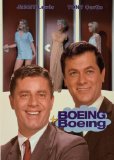| Reviews & Columns |
|
Reviews DVD TV on DVD Blu-ray 4K UHD International DVDs In Theaters Reviews by Studio Video Games Features Collector Series DVDs Easter Egg Database Interviews DVD Talk Radio Feature Articles Columns Anime Talk DVD Savant Horror DVDs The M.O.D. Squad Art House HD Talk Silent DVD
|
DVD Talk Forum |
|
|
| Resources |
|
DVD Price Search Customer Service #'s RCE Info Links |
|
Columns
|
|
|
Boeing Boeing (1965)
My fiancees wheeeeel around the earth, one towards the sun, one towards the moon, and they eventually, in turn, come back to me. It's geometrical. It's poetic.
Another holy grail brought to DVD. Fun upstart Olive Films has released Boeing Boeing (or as it's technically known, Boeing (707) Boeing (707), onscreen), the 1965 Paramount sex farce adapted from the long-running French play by Marc Camoletti, and starring Jerry Lewis, Tony Curtis (or Tony Curtis and Jerry Lewis, if you wait for the revolving credits to roll around again), and the sublime Thelma Ritter. A personal favorite of mine from both of the iconic stars' resumes, this frenetic but perfectly timed, beautifully choreographed bedroom farce is laugh-out-loud funny...and it only gets better the more often you watch it. No extras, unfortunately, for this acceptable transfer.
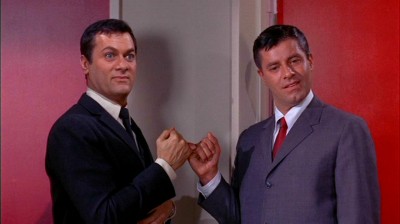
Ingenious philanderer Bernard Lawrence (Tony Curtis) has invented an exhausting but ingenious system to allow himself to play fiancé to three gorgeous airline hostesses. A highly-paid American journalist stationed in Paris, France, Bernard has been, um...supplied with three stews―British United's Vicky Hawkins (Suzanna Leigh); Air France's Jacqueline Grieux (Dany Saval); and Lufthansa's Lise Bruner (Christiane Schmidtmer)―by French interpreter/quasi-procurer Pierre (Lomax Study). Stationed at his luxurious four-bedroom apartment, manned by wearily put-upon American housekeeper Bertha (Thelma Ritter), Bernard maintains an elaborate second-by-second timetable of all three of his globe-hopping fiancees, tending to the one that is currently on the ground with him, while keeping an eye on the flight plans of the other two who are either en-route to Paris, or to their opposite destination. This foolproof plan is interrupted, however, by technology and the most base of human emotions: greed and lust. The introduction of the new Super Boeings for the three airlines now inconveniently (for rake Bernard, that is) cuts travel time for the three stews to two days from the planned-for three, while the unasked-for arrival of newly-stationed professional and romantic rival, Robert Reed (Jerry Lewis), further complicates Bernard's quickly unraveling seduction schedule when Reed wants to get in on the act, too―and ace-out Bernard altogether.
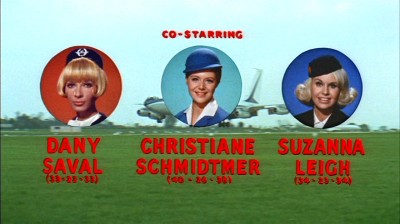
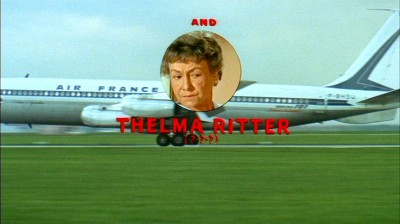
Boeing Boeing has always had a bit of an asterisk by its name for hard-core Lewis admirers (like myself) who like to note not only Jerry's willingness at this point in his solo career to co-star with a name actor who was at least as well-known and popular (Jerry doesn't even appear here until 20 minutes into the movie), but also for Lewis' apparent desire to tone down his celebrated hyperactive on-screen persona (aspects of "The Kid" barely register here) in favor of a more measured, "classic" comedic performance. From what I've read in the past, Boeing Boeing did just okay at the box office when released at the end of 1965, and received mixed-to-good reviews from the critics, but clearly, its reception was hampered by coming at an awkward time in both performers' careers. This would be Lewis' final picture for Paramount (produced by one-time friendly nemesis Hal B. Wallis) after a long, successful association with the studio. Together, the star and studio produced box office hits like The Geisha Boy and The Ladies Man (and his one true masterpiece, the absolutely brilliant The Nutty Professor). However, by 1965, through saturation and overexposure (the studio demanded two Lewis films a year) and a general downturn in Lewis' creativity (Boeing Boeing's predecessor in 1965, The Family Jewels, saw Jerry unsuccessfully shoot for Alec Guinness-like versatility), box office returns were diminishing rapidly, and critics―none to kind to Lewis the auteur from the start―were increasing turning on the actor.
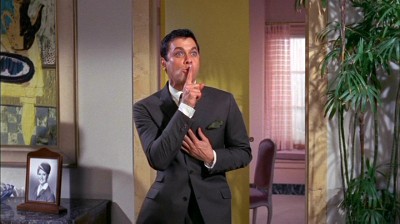
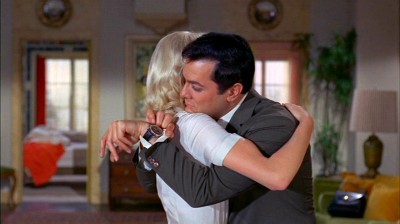
As for Curtis, his once-promising career, marked by critical and box office highs such as Sweet Smell of Success, Some Like It Hot, Trapeze, Operation Petticoat, and Spartacus, masked an increasing tendency to not only share (and therefore diminish) is own solo star status by taking essentially supporting roles when he should have been a headliner only (Taras Bulba, Captain Newman, M.D., Sex and the Single Girl, The Great Race), but also a desire to take any project that came his way, regardless of worth (to fund a nasty, unpopular divorce from star Janet Leigh), resulting in a stream of marginal, fluffy efforts that did him no favors with an increasingly disinterested fan base (40 Pounds of Trouble, Paris When it Sizzles, Wild and Wonderful, Goodbye, Charlie, and even a stint on animated television's The Flintstones). Clearly by the end of 1965, Lewis and Curtis were already on downward career paths. Paramount would "drop" Jerry after Boeing Boeing, where he would go on to other studios to make lesser efforts like Way...Way Out, Hook, Line and Sinker, and Which Way to the Front?, while Curtis, despite a one-shot return to critical acclaim with The Boston Strangler, would soon be mired in efforts like On My Way to the Crusades, I Met a Girl Who..., Monte Carlo or Bust, You Can't Win Them All, and eventually stints on television.
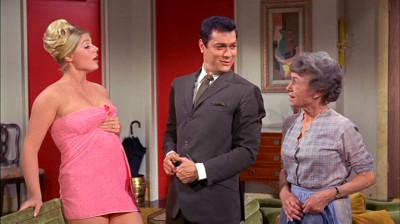
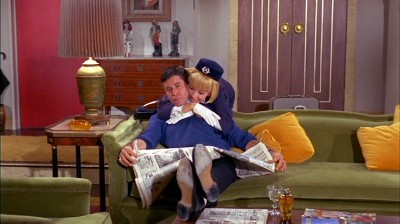
Seen today, though, Boeing Boeing plays as one of the best studio sex farces from the 1960s, maintaining a manic yet perfectly controlled energy that's admirable when compared to the better-known but much more sedate Doris Day efforts that have come to define the genre in that decade. With farce, timing and the implausible made plausible for the in-the-know audience are two key factors, and Boeing Boeing succeeds laudably at both. Recently-passed director John Rich (the excellent later Elvis entry, Roustabout, and numerous TV efforts, most notably All in the Family) keeps the framing simple here, letting Jerry and Tony move about within the relatively calm set-ups as they would on the stage. However, Boeing Boeing is far from static, with Rich blocking the two energetic performers expertly, while Rich continually switches up the camera set-ups, ping-ponging back and forth to drive home maximum freneticism. The airport bar scene is a good example of Rich's blocking elevating what could have been inert exposition ("Don't get up!"), while back at the apartment, Rich is endlessly resourceful in moving Lewis and Curtis around, blocking and slamming doors, and passing off women to and fro.
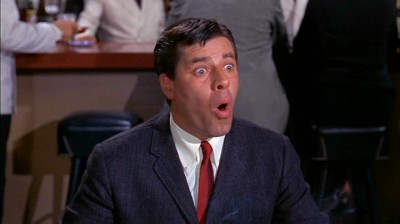
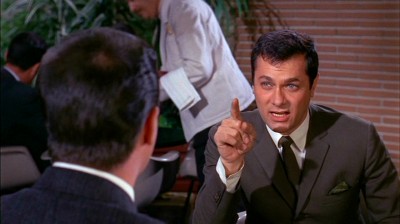
As for the screenplay by heavyweight scripter Edward Anhalt (A Member of the Wedding, The Young Lions, Becket, The Boston Strangler, Jeremiah Johnson), I haven't seen or read the original play by Marc Camoletti (I understand it had a successful revival on Broadway a few years ago), so I don't know what if any lines here come from the original English translation. However, the structure is classic bedroom farce, with the audience two steps ahead of the calculating Romeos, delighting in anticipating their logistical dilemmas as we wonder how Bernard and Robert can possibly continue to juggle all those girls as they keep popping in and out of bedrooms and hallways, without collapsing the whole, intricate shell game. I suppose there will be some offended by Boeing Boeing's central story line, calling it inherently misogynist (cripes), and decrying that the boys technically "get away with it" at the end by merely running away from their problems (only to remain resolutely unrepentant as they contemplate starting up again with three female taxi drivers). I can see the smoke coming out of some viewers' heads at the opening narration alone, when Pierre describes the air hostesses as "delectable creatures, carefully selected for their beauty and charm" (Pierre would weep flying the friendly skies today...), or when seeing the hilarious visual of the actresses' measurements flashed on the screen...with Thelma Ritter's coming up "?-?-?" (maybe the movie's biggest laugh).
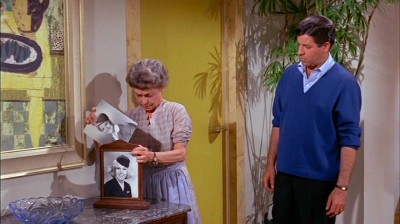
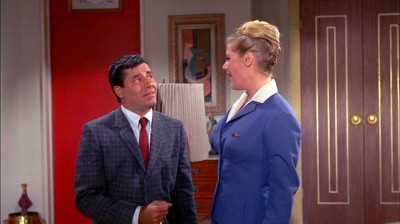
However, the script goes a long way towards mitigating that by making everyone fallible and annoying (as any good farce should), including the stews (if they were sweet and perfect, you'd rightly feel sorry for them), and of course, considering this is 1965, by eliminating all of the implied sex completely (Ritter makes a lot of references to Bernard and Robert being "exhausted," and we're never entirely sure how Pierre actually "supplied" Bernard with his three fiances, but the movie stays G-rated chaste, which again mitigates the reality of Lotharios' shady actions). These two-dimensional characters are perfectly suited for the outsized stereotypes that are necessary for this classic farce structure to work: lecherous playboys with no regard for the feelings of the girls they use (and who also backbite at each other at a moment's notice, before feigning undying friendship when they beg for help with their machinations), and inconvenient, complaining, harping (and frustratingly gorgeous) girlfriends who make perfect foils for the cads ―the brittle, sarcastic British Vicky; the arch, snappish, willful French Jacqueline; and the doltish, commanding Frau Lufthansa (ethnic generalities, to be sure...and all the more funny for their obvious implementation). The average viewer wouldn't identify or sympathize with any of these lovely women singularly, but together, they make a hilarious obstacle to their unfaithful Don Juans' little games (all three actresses ―who are as talented as they are gorgeous―are wonderfully pitched as well, with special mention going to the sensationally solid Schmidtmer; she's hilarious with her commanding "Jas" and her giggling dimness).
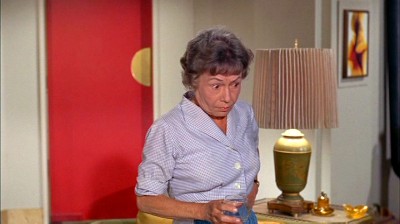
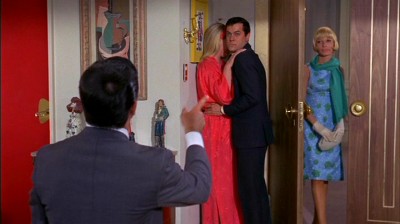
Politics aside, most importantly, Boeing Boeing is consistently hilarious (and I might be tempted to give half of the credit for that amusement to composer Neal Hefti's insanely catchy, bouncy, effervescent "La La" score ―one of my all-time favorites). The movie's best lines are delivered from scene stealer extraordinaire, Thelma Ritter, who is used expertly by Rich as an intrusive, eavesdropping interloper who, through ESP or bionic hearing, wearily pushes through her kitchen door ("It's not easy, you know?") at the most inopportune times to deliver a withering retort before she scrambles to hide incriminating ethnic food or lingerie ("You don't need a housekeeper around here, you need a UNIVAC machine!"). Lewis is indeed subdued...for Jerry (he does indulge ever so slightly in a few "Kid" moments, such as the distinct Jerry cry as he struggles to get his bags through a doorway), keeping his performance relatively low-key and supportive, but in no way less amusing for the restraint (his timing against the peripatetic Curtis is flawless).
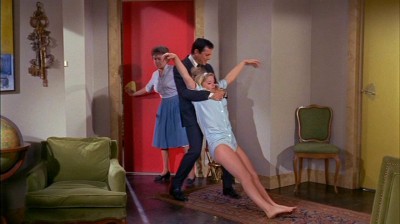
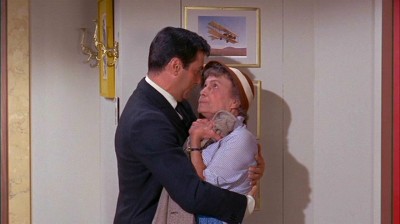
As for the manic, ballet dancer Curtis, you can spend the whole movie just watching his constant, lightning-fast flow of annoyed, exhausted, terrified, triumphant, leering reactions to the constant parade of complications that come his way (his look of supreme embarrassment when Vicky describes their sappy habit of looking at the moon together, is a symphony of perfectly orchestrated mugs...with Lewis getting a laugh, too, responding to Vicky's naive sincerity with a flat, dismissive, "That's cute."). Curtis, another particular favorite of mine in so many movies, including his tour de forces in Sweet Smell of Success and The Boston Strangler, gives to my mind his most joyous performance here in Boeing Boeing, showcasing his too-slick, conniving, almost gamey sex appeal to brilliant comedic advantage. Insecure, touchy Curtis may not have exactly enjoyed working with the joke-playing, upstaging Lewis (the word "schmuck" is used for Lewis in Curtis' biography), but there's no denying that together, both actors hit high notes here at a perilous time in both of their careers. As fresh and as funny as Boeing Boeing plays today, it's a shame they didn't collaborate again.
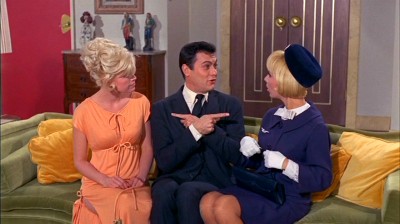
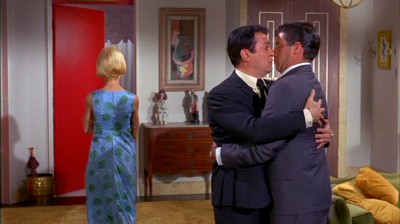
The DVD:
The Video:
The anamorphically-enhanced, 1.78:1 widescreen transfer for Boeing Boeing looks a little tight at times (wouldn't this have been at 1.85:1 in theaters?), and the colors are a tad muted (the reds look a little brown and mushy, with jaggies on the credits). Still, the image is sharpish, with few imperfections.
The Audio:
The English mono audio track is clean, with little or no hiss, and all dialogue heard cleanly. No subtitles or close-captions.
The Extras:
No extras, not even an original trailer (a disappointment, considering the wealth of extras for the Lewis boxed set from a few years ago).
Final Thoughts:
Perfection. A bedroom farce pulled off with clockwork-like precision by its expert cast. Boeing Boeing has one of Jerry Lewis' more unexpected performances in it (too bad he didn't try this smooth comedic persona more often), as well as one of Tony Curtis' all-time best, as the two name actors beautifully play-off each other (with Thelma Ritter topping them both, stealing every scene she's in). Despite its blown-off reputation, Boeing Boeing is one of the best studio sex farces of the 1960s. Had there even been one little extra included here―a trailer, a single still ―I would have awarded Boeing Boeing, on content alone, our highest award here at DVDTalk: the DVD Talk Collector Series. However, highly highly recommending Boeing Boeing will have to do.
Paul Mavis is an internationally published film and television historian, a member of the Online Film Critics Society, and the author of The Espionage Filmography.


|
| Popular Reviews |
| Sponsored Links |
|
|
| Sponsored Links |
|
|
| Release List | Reviews | Shop | Newsletter | Forum | DVD Giveaways | Blu-Ray | Advertise |
|
Copyright 2024 DVDTalk.com All Rights Reserved. Legal Info, Privacy Policy, Terms of Use,
Manage Preferences,
Your Privacy Choices | |||||||









